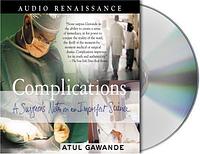Take a photo of a barcode or cover
520 reviews for:
Complications: A Surgeon's Notes on an Imperfect Science by Atul Gawande
Atul Gawande, Atul Gawande
520 reviews for:
Complications: A Surgeon's Notes on an Imperfect Science by Atul Gawande
Atul Gawande, Atul Gawande
I waited until after my surgery to read this book, which was a good idea, and was really looking forward to it. I wasn't as wowed as I thought I would be though. His writing is excellent but as other have mentioned, each chapter feels as if it could stand alone, with little connecting the book together as a whole. I also felt that the issues Gawande presented are the same as many other medical books I've read - like the fallibility of doctors, uncertainty making medical decisions - so the material felt unoriginal and a little dry to me. Still worth the read, though.
hopeful
informative
reflective
medium-paced
I'm glad I read this book. Complications is enlightening to those in the medical field and those who are not alike. It is inspiring for the former group as it believes that the struggles doctors face everyday are universal and human and that they are not alone; it is eye-opening for the latter as the book uncovers the insides and secrets of medicine (plus the real-life cases teach some medical knowledge, too). Will definitely read Gawande's other books.
It was captivating, reflective, and motivational for me as an aspiring medical professional.
hopeful
informative
reflective
medium-paced
What’s The Point?
As a computer engineer of sorts, science and related engineering fields interest me. The book offers anecdotes from several different fields of medicine, explaining some of the science behind the field and the sometimes the utter lack therefore. Doctors are humans and humans are imperfect, but oftentimes, it seems like doctors do not want to improve and do not or can not look objectively at themselves. This book helps to explain how doctors can get there and does it a funny interesting manner.
How Was It?
Great, quick, read that is well organized, researched, covers historical elements of medicine, and very human all at the same time.
Who Should Read It?
Anyone interested in learning more about the science of medicine and learning how doctors exist.
As a computer engineer of sorts, science and related engineering fields interest me. The book offers anecdotes from several different fields of medicine, explaining some of the science behind the field and the sometimes the utter lack therefore. Doctors are humans and humans are imperfect, but oftentimes, it seems like doctors do not want to improve and do not or can not look objectively at themselves. This book helps to explain how doctors can get there and does it a funny interesting manner.
How Was It?
Great, quick, read that is well organized, researched, covers historical elements of medicine, and very human all at the same time.
Who Should Read It?
Anyone interested in learning more about the science of medicine and learning how doctors exist.
emotional
informative
inspiring
reflective
sad
medium-paced
This is Gawande's first book, and it might be my favorite book of his, because he doesn't sound confident. He's not yet "the famous Atul Gawande" who can be published in The New Yorker whenever he wants. He's just a young surgeon trying to make his way in a very confusing medical world.
This is perfect for people who like humility and people who are suspicious of their doctors. But I'm roughly neutral on both of those positions, and I still liked it.
This is perfect for people who like humility and people who are suspicious of their doctors. But I'm roughly neutral on both of those positions, and I still liked it.
I truly enjoyed reading through Atul's experiences as a surgeon. It gave me the opportunity to hear about life in the surgical field from a resident surgeon who can eloquently relay their experiences in the field. It was also a little shaking to realize how imperfect the science of applied medicine is. So many decisions and procedures can change merely by the time of day, time of year, or even the last patient the doctor saw. It goes to show that even with the medical training and extensive safeguards in place, medicine comes down to human judgment in the end (which is still very flawed at its best).
Gawande does a great job at explaining his cases, making them both easy to understand and interesting enough to keep reading, but I felt some of the cases felt disjointed while at other points the messaging felt repetitive.



